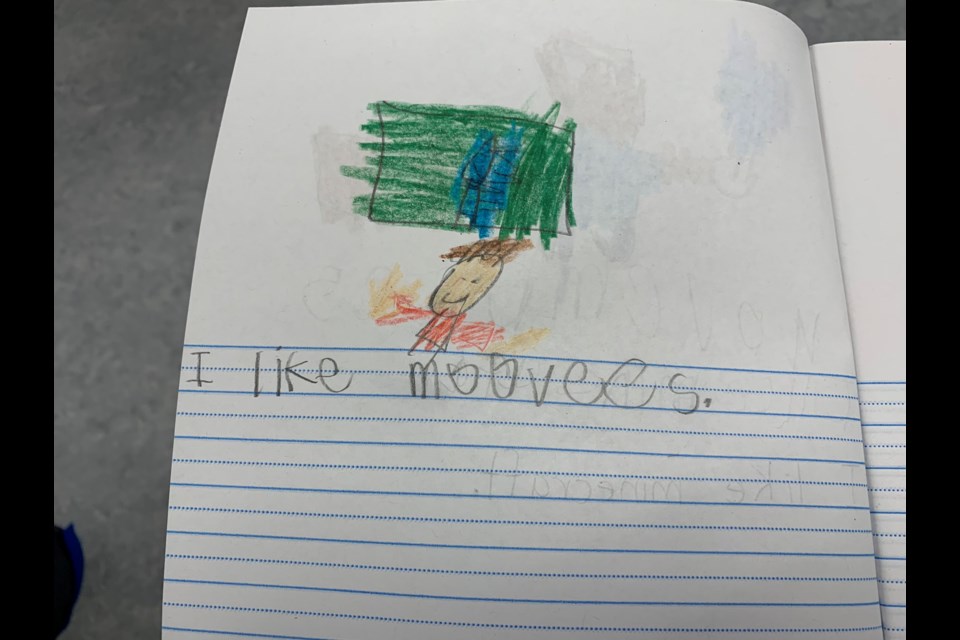ROCKY VIEW COUNTY— Teaching literacy through play, Rocky View Students are learning the art of story creation through a unique program that taps into their imaginations.
Story Workshop serves as an opportunity to motivate students to achieve their full potential when it comes to literacy.
The goal is to inspire their student's imaginations and encourage them to share stories, said Fireside School Grade 1 teacher Carleen Pocklington. She described Story Workshop as a program working to bring "literacy to life for students."
The program was created at Opal charter school in Portland, Oregon. It was designed to explore the connection between literacy and the arts through collaboration and social engagement, said Fireside School Kindergarten teacher Alison Humphrys.
Story Workshop supports literacy in young students through four major pillars— Sharing stories, immersion in the arts, time for playing and a focus on meaning-making.
"They come to us full of their own thoughts, ideas, memories and stories," Pocklington said.
A provocation to create a story can come in many different forms, she said, explaining activities are designed to provoke thoughts, ideas and actions that can expand on a student's idea for a story. The provocation is an open-ended question that encourages students to explore their ideas with minimal teacher direction.
"It sparks imagination in the students, it allows for flexibility in their writing tasks and it allows for differentiation and inclusion in the classroom," Pocklington said.
Northcott Prairie School teacher Kelsey Bagnall said deep preparation goes into developing Story Workshop for students and a strong sense of relationship-building is built into the program. She explained nurturing those connections helps teachers understand what students are interested in and where their strengths lie.
"When you prepare and organize the materials for play that develop into their stories it is something that they are interested in," Bagnall said. "The structure of Story Workshop looks different in every single classroom that has story workshop— But, generally the structure is fairly similar."
She noted the preparation for the program has been adapted due to COVID-19 and they have modified the structure of the Story Workshop to maintain public health measures.
Students will typically have a creating time to play with different materials like drawing, building blocks or painting to create stories. As their writing and confidence as an author grows, they will spend more time drawing and writing stories.
"Students always know if they get stuck in their stories and they don't know what to do next they can go back to their materials and that will help them figure out what's next," Bagnall said.
Story Workshop helps students develop a better understanding of what a story is, what an author is and what an illustrator is, Bagnall said, while exploring their emotions and feelings and developing their vocabulary and spelling abilities.
The program is tailored to grade levels, for example, Kindergarten students will learn about what happens in a story using illustrations. As students learn their letters and sounds, they will be able to build and develop their own stories using other mediums.
Grade 1 students further develop their story ideas and learn about the grammatical parts of a sentence.
"The student's volume of writing increases," Pocklington said. "Students become focussed on parts of a story including the beginning, middle and end of a story and using transition words."
Pocklington said the feedback they receive from students during Story Workshop is the most important aspect of the program. The feedback students share serves as an opportunity to celebrate their literacy progress while honouring the unique stories they create.
Stories are shared with their peers, teachers, groups and community feedback. While initially, it was hard to engage with the greater community. Teachers have adapted to COVID-19 using online forums and have had grandparents from as far away as Ontario leaving comments on Story Workshop projects.
It is important to have these opportunities because it allows for feedback on stories, which in turn allows students to become better writers.
Pocklington said by the end of the year her Grade 1 class has a published piece of work to showcase the stories. The project includes writing, illustrating and publishing experiences for the students.
Her goal is to expand the program into Grade 2 next year to help to continue to support and harness their creativity and excitement.
She hopes to see the level of engagement increase as older student participate in Story Workshop, she said, because play can be used to continue to explore those impacting questions regardless of age.
Ward 3 Trustee Melyssa Bowen said the program is an incredible opportunity to share and inspire literacy practices in students.
"I love that comment ... around how creative young people are and how you really want to harness that," Bowen said. "I love that."
Board Chair Fiona Gilbert said she appreciates the program's ability to tap into the "enormous energy" Kindergarten and Grade 1 students have at school.
She asked if Story Workshop could build up into high grades including middle and high school to continue harnessing that excitement. Gilbert said she hopes to see the program grow and expand in the division so more students have the opportunity to engage in Story Workshop.
"We are continually inspired by the work that our staff and teachers are doing for their students across the division," Gilbert said.




